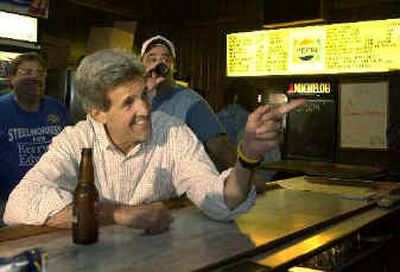Bush, Kerry stump for votes in ‘swing’ Ohio

BROADVIEW HEIGHTS, Ohio – President Bush and Sen. John Kerry both descended on the Rust Belt on Saturday, stumping for votes in the swing state of Ohio as Kerry unleashed fresh criticism on Bush’s economic record, saying the president has turned his back on seniors and workers.
At a morning rally in Akron, 25 miles south of where Bush was speaking in a packed high school gymnasium in this Cleveland suburb, Kerry seized on an announcement by the government Thursday that the Medicare premiums seniors pay for doctor visits will rise by 17 percent next year.
“Who are they going to send the bill to?” Kerry, D-Mass., asked. “Are they going to send the bill to Halliburton? Are they going to send the bill to Ken Lay and Enron? You bet they’re not. They’re going to send the bill to our senior citizens.”
In announcing the Medicare premium, which is set annually by a formula written in law by Congress, administration officials said higher health-care costs as well as better benefits and more access to doctors under Medicare prompted the hike.
While visiting this manufacturing state, Kerry also accused Bush of having “a record of failure” in creating jobs. He pointed to government figures showing that slightly fewer jobs were created in August than economists had predicted. The senator also said the net loss of jobs under Bush’s watch likely make him the first president in nearly eight decades to have lost jobs over a four-year term.
“They can’t come here to Akron or to any other place in America and talk to you about all the jobs that they created because they haven’t,” Kerry said.
The president’s assessment of the economy was far rosier. “When you’re out gathering people up to vote, just tell them the facts,” he said. “The country has gone through a recession, went through corporate scandals which affected the confidence of our economy and we endured a terrorist attack. And that attack hurt our economy. In other words, there was great obstacles to growth, yet we’re overcoming those obstacles today.”
Mindful that Kerry’s attacks could resonate in a state where the economy is struggling, Bush was careful to convey to Ohioans that he empathizes with people still feeling a squeeze or struggling to find work.
“I understand there’s places in America … that lag behind the national growth rate,” Bush said. “Ohio has got pockets of unemployment that are unacceptable.”
The president said that his record on the economy is one of creating jobs steadily for months and one that has delivered tax relief to individuals and small businesses, spurring growth. He said he is convinced his opponent, if elected, would raise taxes.
John Mueller, a political scientist at Ohio State University who focuses on war and public opinion, said that as the rate of American casualties in Iraq has slowed in recent weeks, Bush has turned voters’ attention to the broader war on terrorism. He said Americans have shown “declining interest” in Iraq and that, “If Bush can sell the idea that the war on terror is all that’s important, he is in great shape.”
Mueller added, however, that large numbers of Americans still have doubts about the justification for war, leaving an opening for Kerry. “But the senator has not leaned into Bush on Iraq as much as the anti-war wing of his party would like,” he said.
Phil Singer, a Kerry spokesman, said the Massachusetts senator remains confident that many Americans are frustrated that Bush’s decision to launch war “left the U.S. alone in the world.” Singer added: “This issue is not going away.”